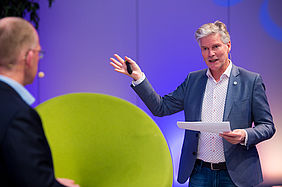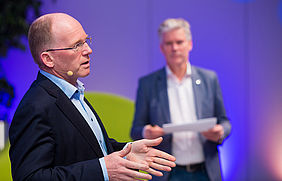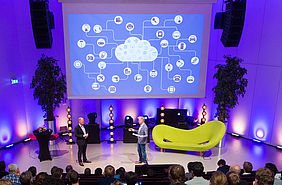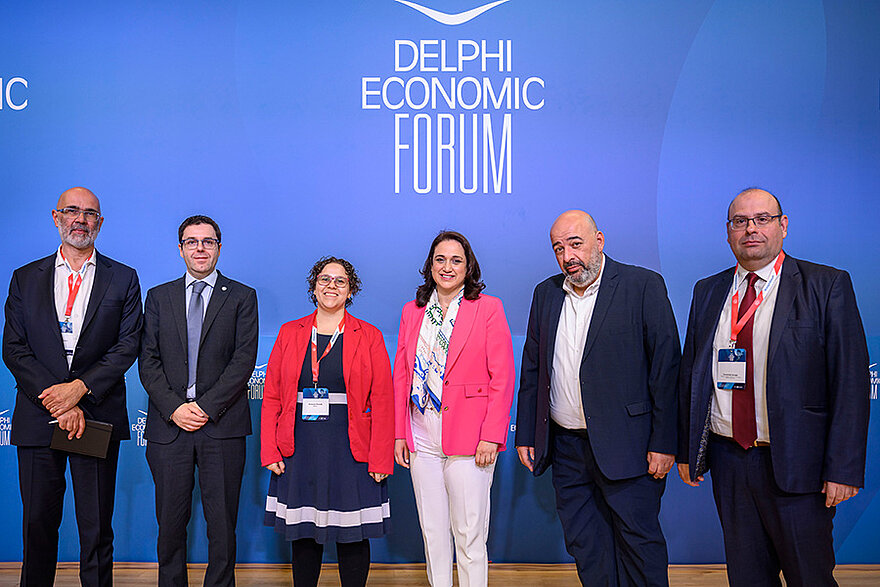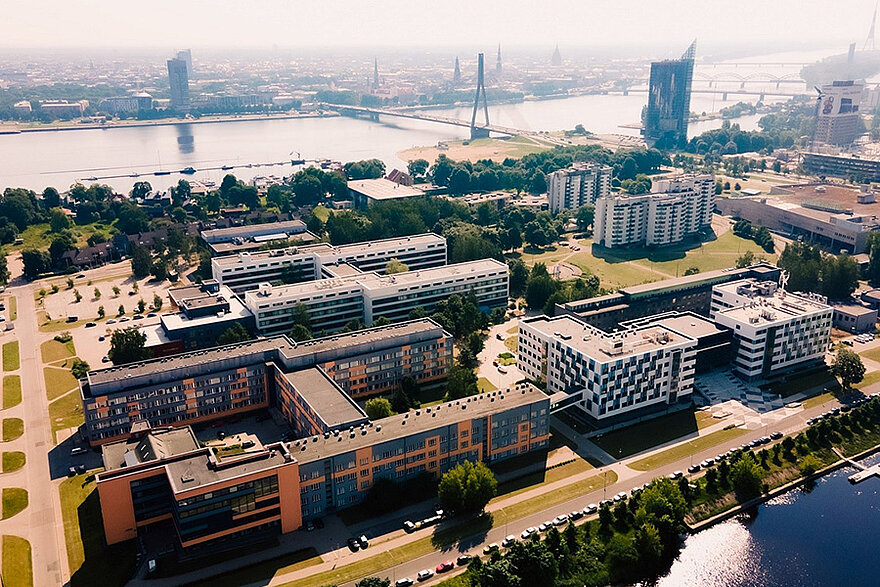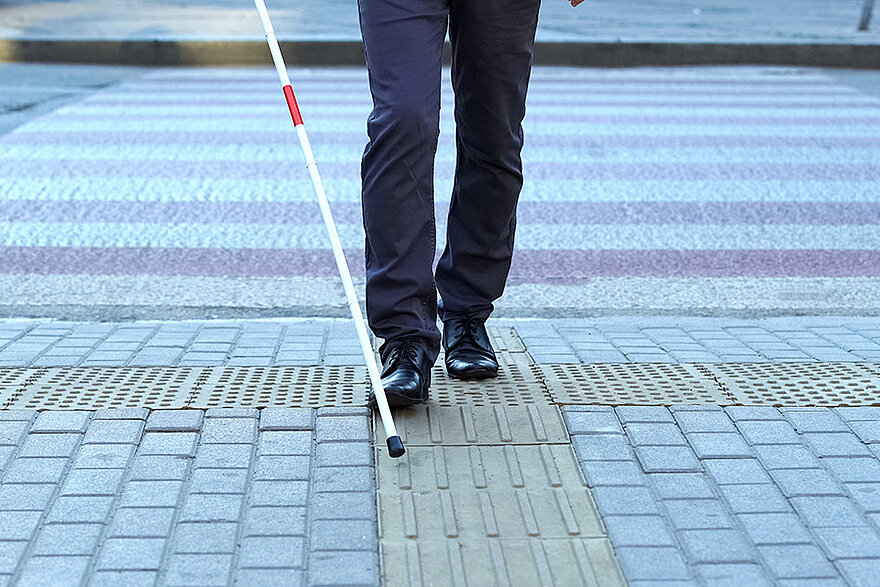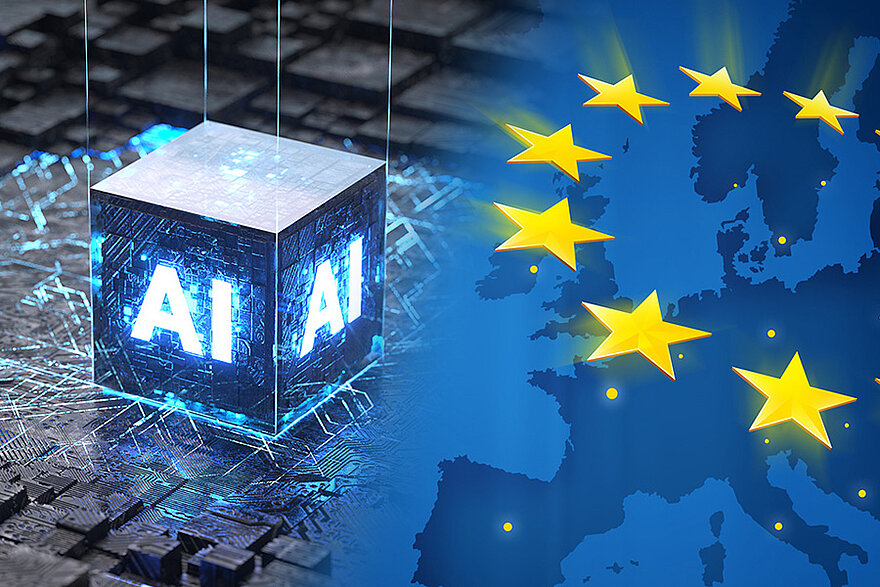Internet pioneer Kees Koolen, also known as Mister Booking.com, is the founder of EQT Ventures, runs a tech farm in Brazil, consults Uber and in between drives the Dakar Rally, a two-week race through Paraguay, Bolivia and Argentina, on his adapted quad. He's also a former student of the University of Twente, and spoke to Professor and CEO of EIT Digital, Willem Jonker, about the Internet of Things (IoT) during the university's CTIT Symposium on 14 November 2017: Internet of Things is ready. What about us?
Jonker: "You started Booking.com while still studying at the University of Twente. What was the role of the university in starting up Booking.com?"
Koolen: "In general technologies are invented 20 years before they get used on a big scale. There is a time when new technologies arise at universities. The question is then: what can you do with it? In my time, the internet came up. The study system back then was different than it is nowadays; students had a lot of time to experiment. I was asking myself, would you have come to a certain hotel if you knew it beforehand? Other students were already building websites. That is how we started. So yes, the university environment did a lot."
Jonker: "The Internet of Things is a huge data generator. People are worried. Is the IoT a good idea?"
Koolen: "Yes, it is. In the beginning with new technologies, there are no rules. As a new company, you can do what you want. But now you have red lights. There are big issues around it, like privacy and security. Privacy is simple. Everybody has two personas: consumer and citizen. If you are a citizen, you think privacy should be protected bi8u790ut as a consumer, you don't care. Technology companies have no choice but to follow the privacy rules. I think privacy is a big issue on the side; you just have to follow the rules.
Security is the big thing. For example, in a company I was involved in, we made sensors. We invited hackers from Syria and Russia. They can hack any plant. If sensors are used at a large scale, it means people buy these things and they want the cheapest price. But, the lower the price, the lower the security. There are always components that are not secure. This is what hackers call the race to the bottom. Every big processing plant can be turned over by hackers."
Jonker: "Is there an opportunity for IoT platforms in Europe? What needs to be done to enable them?"
Koolen: "There is a big opportunity. The level of knowledge in Europe is much higher than in the United States (US). There is much more innovation. It is a lot different than five years ago. But we need people who can take our knowledge to the field. What you see now is that the American VC's are starting to come to Europe. Compared to a few years ago, there is more money available now. So, we will have the platforms soon. Europe is way ahead in knowledge on artificial intelligence and deep machine learning. We have more knowledge but we have to do more to make it commercial."
Jonker: "Companies in Europe seem unable to mobilise money and to scale-up. Is there enough know-how?"
Koolen: "I was one of the only ones in Europe when I started EQT Ventures. In Europe, entrepreneurs who build a venture are happy if they can sell it to American VC's for ten million dollars. In the US, you don't work for money, you work for your vision. By the time you get money, you practically don't need it anymore. People like Mark Zuckerberg (Founder, Facebook), Larry Page (Founder, Google), do not use the money for themselves, they invest in new companies. That is the big difference with Europe. If you don't have the spirit to scale-up, you don't have money to invest and grow."
Jonker: "You built your own Quad and won the Dakar Rally. What has your hobby to do with innovation?"
Koolen: "When you only work, you make mistakes. You need to get out sometimes. It is good to have a break. I am 52 years old and by far the oldest to do this. I thought it was stupid to use old technology. You ride in extreme conditions: dust, sun, rain, through the river on ice; the fuel is sometimes good and sometimes that bad that if you put a flame to it, it won't light. We spent five months on special mapping. If you build new technology, you can beat everybody. The quad has a lot of electronics in it and has more horse power."
Jonker: "The Internet of Things is booming in cars. What are the opportunities for the Netherlands? We don't build cars so what can we do instead?"
Koolen: "We have companies like NXP. There is a lot of software in cars and most of it comes from NXP. Americans want to buy the company - it was originally part of Philips. The Netherlands are very good in car software, Sweden is also, and London and Berlin have a bit of the market too. We are now heading towards autonomous cars. There will be fewer accidents with autonomous cars. The cars can learn and never get tired. In 20 years from now, people won't be allowed to drive a car in the city anymore. Too many casualties."
Jonker: "You are building the largest farm in the world with 31 thousand acres of land, and will have over one million cows one day. The farm will not just be a farm, it will be a high-tech farm. Can you tell us why you want this?"
Koolen: "The farm is about helping poor people. I will explain. People need protein. Protein is expensive. Without protein, you cannot live. Cows produce milk and therefore protein. The problem is that with the production of milk you get a lot of CO2 emissions. We need to see if we can reduce CO2 emissions. It may even be possible to produce milk without these emissions. We have calculated that we can lower the price for the production of protein by introducing Internet of Things technology. We can predict when cows get sick, when and how they move, and what their temperature is. With technology, you can improve agriculture. And in this case, you have protein available for lower costs and with fewer cows. I think in thirty years' time, we won't need cows anymore for producing protein. Most sectors in the world don't use IoT technology yet. I envision a big future for data analytics and artificial intelligence in the agricultural sector."
Jonker: "With your EQWT Ventures you invest in companies. For example, Aifloo, an EIT Digital member, has developed a non-intrusive e-health system based on Medical Artificial Intelligence. Why do you invest in companies like this?"
Koolen: "I want to invest in things that grow. Within the development of IoT, there is a big gap between technologies that works and technologies that make money. See, products like Fitbit are popular when they are brought to the market; the technology is simple and the product is cheap. People get used to it and don't use it anymore after a while. Getting successful means collecting data and helping to save lives. Healthcare is expensive. We cannot keep up the system as it is now. We have to reduce costs while maintaining quality of care. Using Aifloo, you can improve the efficiency of healthcare and optimise care. With this technology, care workers can see if patients are doing well, rather without intervening when there is a deviation in their patterns, like moving, eating or sleeping. It is cheaper to use this kind of eHealth solution than having full-time healthcare. That is why hospitals are willing to pay us €50 per month to use Aifloo. You can save lives with technology. I envision in 20 years from now, everybody will have wearables."
